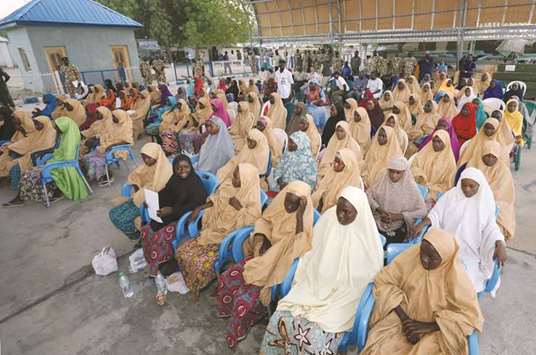Boarding schools have been shut indefinitely in the northeast Nigerian state most affected by Boko Haram violence, the government has said, in the latest blow to children’s education.
“All boarding secondary schools in the state, with the exception of those in (the state capital) Maiduguri and (the town of) Biu, will close down with immediate effect until further notice,” the Borno state government said.
Borno is the spiritual home of Boko Haram militants, whose name translates loosely from Hausa as “Western education is forbidden”.
The high-profile abductions of more than 200 schoolgirls in Chibok, Borno state, in April 2014, and 110 others from Dapchi, Yobe state, in February this year also led to closures.
Scores of those abducted from Dapchi were released on Wednesday. The captors gave no reason for their release.
Schools that teach a so-called secular curriculum have been repeatedly targeted during the insurgency, which since 2009 has left at least 20,000 people dead.
According to the UN children’s agency Unicef, more than 2,296 teachers have been killed and some 1,400 schools destroyed in the wider northeast region.
Mohamed Bulama, the Borno commissioner for home affairs, information and culture, said on Wednesday the decision was taken last week after a Boko Haram attack in Rann on March 1.
Three aid workers and eight security personnel were killed in the attack on the remote town near the border with Cameroon, which led to the withdrawal of aid agencies.
Schools have previously been shut in the wake of deadly attacks in Buni Yadi, Yobe state, when more than 40 students at a boys’ boarding school were killed in a Boko Haram attack.
Bulama said “urgent and immediate measures” were being taken to improve security but the closures are the latest disruption to schooling in an area already hit by low levels of education.
At the start of the new academic year in September last year, Unicef said at least 57% of schools in Borno remained closed.
It warned the situation threatened to create “a lost generation of children, threatening their and the country’s future”.
Meanwhile, the UN said it has resumed operations in the town of Rann in northeast Nigeria, just over three weeks after a Boko Haram attack killed three aid workers.
“The authorisation by the United Nations for flights to resume to Rann for aid workers was taken on Monday. The first flights went on Tuesday,” said UN spokeswoman in Abuja Samantha Newport.
“UN aid workers are not authorised to overnight (in Rann) and daily operations are expected to continue until the security conditions are met,” she said.
Heavily armed Boko Haram fighters attacked a military base in the Borno state town next to a camp housing some 55,000 people displaced by the insurgency.
Eight security personnel were killed with three Nigerian aid workers employed by the Unicef and the International Organisation for Migration (IOM).
Humanitarian operations, including food distribution, provision of shelter, emergency medical care, clean water and sanitation programmes, were suspended because of security concerns.
The UN said at the time that there would be minimal impact on people at the camp and some 25,000 others in the town who also rely on aid agencies.
The medical charity Doctors Without Borders (MSF) also pulled out.
It is understood that MSF teams have also been making daily trips to Rann by helicopter.
The IOM, which tracks movements of internally displaced people and refugees from the conflict, said 100 households from Rann had arrived in the Ngala area in the past three weeks.
Boko Haram’s attack in Rann underscored continued concerns about the militants’ strength, despite government and military claims the group is on the verge of defeat.
Abuja maintains Boko Haram no longer holds territory but aid agencies say two areas of Borno - the district of Marte next to Rann and Abadam, near Lake Chad - remain inaccessible.

Some of the newly released Dapchi schoolgirls wait for boarding a plane at the air force base in Maiduguri, Nigeria.
